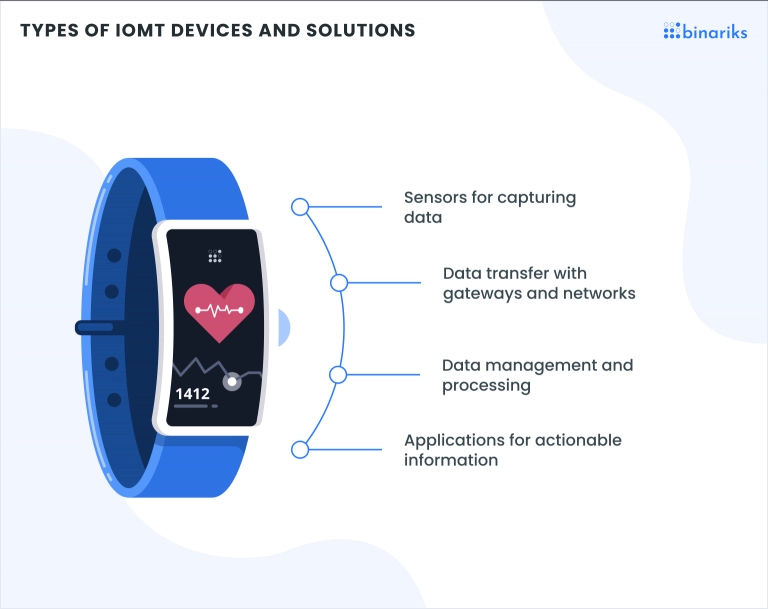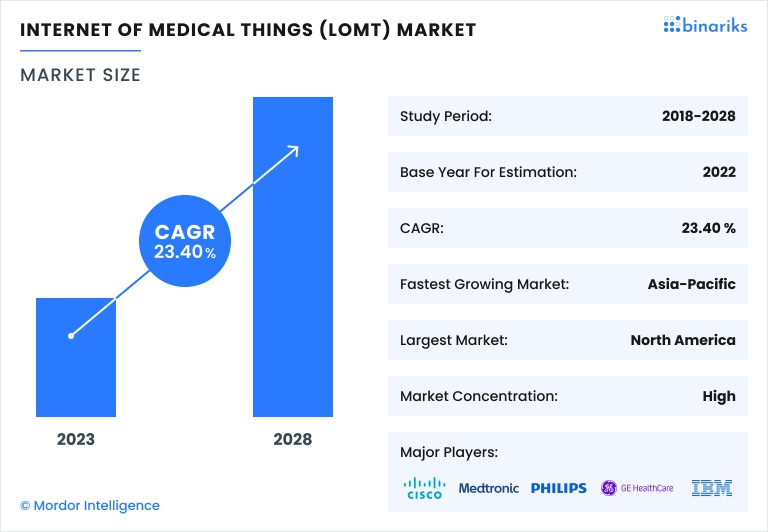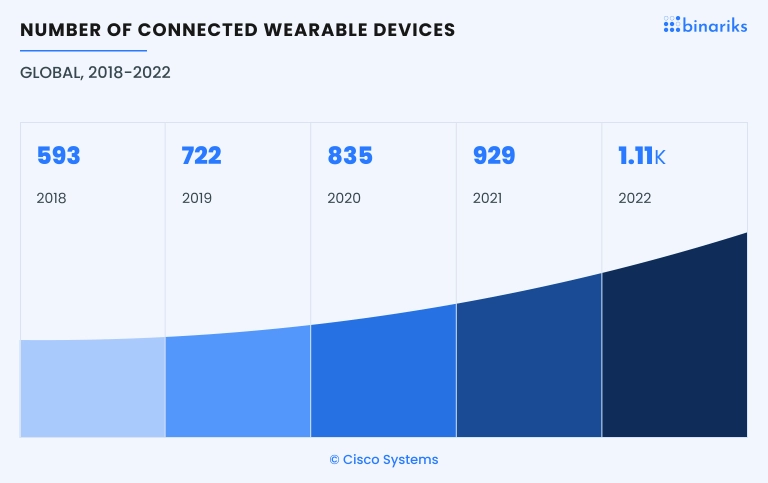The Internet of Medical Things (IoMT) is a rapidly growing technology that significantly impacts healthcare delivery.
IoMT stands for Internet of Medical Things and refers to the infrastructure of medical devices, software applications, services, and networks that connect them to healthcare/telemedicine platforms. It aids healthcare professionals in effortlessly gathering patient health data, which can then be utilized to enhance disease diagnosis, treatment, and prevention.
As experts in medical technologies, we are excited to share our knowledge about IoMT with you. In this article, we will discuss the benefits, opportunities, and prospects of IoMT technology for healthcare delivery and highlight some of the challenges and drawbacks facing IoMT. Let's dive deeper into the details!

Internet of Medical Things market size & stats
The IoMT market is growing rapidly. It is projected to experience a Compound Annual Growth Rate (CAGR) of 23.4% in 2023-2028 (source ).

The growth of the IoMT market is being driven by a number of factors, including:
- The aging population and the increasing prevalence of chronic diseases;
- The need for improved patient care and outcomes;
- The rising cost of healthcare;
- The increasing availability of wireless connectivity and data storage.
Market trends
Here is a short list of healthcare technology trends where IoMT has started to gain momentum.
- Healthcare tech advancements bring transformative changes. IoMT connects medical devices for remote patient monitoring, enhancing healthcare without direct interaction.
- IoT medical devices like glucose and ECG monitors redefine healthcare. They offer continuous assistance and services, boosting patient satisfaction and care quality.
- Cisco predicts 50B+ internet-connected devices worldwide in 5-6 years, with 30% in healthcare. Adapting connected devices requires demonstrating their value in advancing patient care.
- IoMT market surges due to key player collaborations and novel offerings. LifeQ and CONNEQT partnership, for instance, expands wearable health insights with innovative fingertip sensors.

The medical Internet of Things is one of the promising trends in healthcare technology. It has the potential to revolutionize healthcare delivery by improving patient care, reducing costs, and improving efficiency.
Types of IoMT
IoMT is the global network of both physical assets, like various sensors, devices, etc., and software applications connected by the internet.
Interconnectivity is the crucial feature of IoMT solutions as they are foremost for transmitting information over a secure network. For example, a certain device is used to monitor different patients' indicators. The resulting data then must be collected, analyzed, and transmitted via EHRs, special IoMT applications, or other digital platforms so that a healthcare provider can take further steps depending on the circumstances.
Roughly speaking, IoMT technology can be applied at each stage of the above processes. Thus, it's worth highlighting different types of IoMT:
- Home IoMT: Health devices for home use, like Medical Emergency Response Systems (MERS) or Medical Alert Systems, offer quick assistance in emergencies through a button press. Other devices include pulse oximeters for oxygen levels, sleep trackers, and medication dispensers for reminders.
- Public IoMT: Public IoMT, also called community IoMT, extends healthcare to underserved areas. Examples include kiosks and vending machines with connected devices dispensing medical products and services to remote locations.
- Wearable IoMT: Wearable medical devices come as consumer wearables and clinical devices. Consumer wearables track health for both patients and healthy individuals, like Apple Watches detecting irregular heart rhythms. Clinical devices focus on specific metrics, connecting directly to healthcare providers, especially for conditions like diabetes.
- In-Hospital IoMT: In-Hospital IoMT aids interactions between staff and patients. Devices like bedside stations, intelligent emergency systems, electronic bracelets, and body-signal collectors improve communication and emergency response within healthcare facilities.
How to build HIPAA-compliant IoMT solutions?
Learn about best practices of FHIR implementation.

Impact of IoMT on healthcare
Reducing healthcare costs & healthcare system burden
IoMT has demonstrated a remarkable potential for reducing healthcare costs through improved efficiency and resource allocation. For example, patient falls, injuries, and diseases can be detected with remote diagnostics and video surveillance. And in general, IoMT makes it possible to provide proper care without planned/specialized visits (source ).
Also, IoMT devices and sensors can reduce the need for clinical visits and hospitalization, which, according to Goldman Sachs, could save the global healthcare sector US$ 300 billion each year (source ).
The Centers for Medicare and Medicaid Services found that the US healthcare system spent an average of $12.914 per patient in 2021. IoMT solutions can help further reduce per-patient costs by providing increased accessibility and preventive care options.
Hospitals and clinics will experience a decrease in patient numbers as non-emergent patients are provided with flexible eHealth solutions for routine checkups and preventative care (source ).
Enhancing medication management
IoMT contributes to enhancing medication management by ensuring patients adhere to their prescribed regimens.
Smart pill dispensers and connected inhalers track medication usage and provide reminders. For example, using smart pills in monitoring the efficacy of cancer therapies, clinicians could spot when patients missed a dose of an oral chemotherapy drug or failed to take it properly. This allowed the practitioners to step in and realign the treatment plan before any complications arose.
This micro-sensor technology has also been used to the same effect with psychiatric patients to ensure the safe and continuous self-medication of antipsychotic drugs (source ).
Personalized treatment plans
IoMT's data-driven insights enable the creation of personalized treatment plans, tailoring medical interventions to individual patient needs.
For instance, wearable sensors and smart implants enable continuous monitoring of chronic conditions like diabetes, cardiovascular diseases, and respiratory disorders. Real-time data collection and alerts to healthcare providers enable proactive interventions and personalized treatment plans.
This approach improves patient management and reduces the risk of complications (source ).
Preventive care and early detection
IoMT plays a pivotal role in promoting preventive care and early detection. Wearable devices monitor vital signs and health metrics continuously, alerting users and healthcare providers about any anomalies.
This real-time monitoring aids in identifying potential health issues before they escalate, enhancing patient safety. For example, smartwatches equipped with ECG capabilities can alert users of irregular heart rhythms, prompting them to seek medical attention promptly and preventing adverse events. And another example is early COVID-19 detection (source ).
The impact of the medical Internet of Things on healthcare is profound. It affects various facets of cost reduction, resource optimization, medication management, treatment personalization, and preventive care.
Internet of Medical Things (IoMT) companies
Here is the list of IoMT companies that contribute to the growing landscape of IoMT, driving advancements in healthcare through technology, connectivity, and data-driven solutions.
- GE Healthcare: A global leader in healthcare technology, GE Healthcare offers a range of IoMT solutions such as medical imaging, monitoring devices, and hospital management systems. Their technologies help healthcare providers improve patient care, optimize operations, and enhance diagnostics.
- Medtronic PLC: Medtronic specializes in medical devices and therapies, with IoMT solutions spanning areas like implantable devices, remote monitoring, and chronic disease management. Their technology connects patients and healthcare professionals for better treatment management.
- Cisco Systems, Inc.: CiscoCisco provides networking and communication solutions for IoMT applications, ensuring secure and seamless data transfer between medical devices and systems. Their expertise lies in building reliable infrastructure for healthcare connectivity.
- IBM Corporation: IBM offers IoMT solutions for healthcare data analytics, AI-driven diagnostics, and population health management. Their technologies assist in deriving insights from medical data to enhance decision-making and patient care.
- Boston Scientific Corporation: Boston Scientific's IoMT solutions often revolve around medical devices for minimally invasive procedures, like pacemakers and implants. Their technology aims to improve patient outcomes and quality of life.
Lead the race for innovations with custom IoT development
Custom IoMT solutions
Creating tailored IoMT solutions for healthcare offers a powerful way to address specific needs and challenges within the industry. To embark on building custom IoMT solutions, several best practices can guide the process:
- Comprehensive needs assessment: Begin by understanding the precise requirements of the healthcare setting where the IoMT for healthcare solutions will be deployed. Identify pain points, workflow inefficiencies, and areas that could benefit from enhanced connectivity.
- Collaborative design: Involve healthcare professionals, technology experts, and stakeholders in the design phase. Collaboration ensures that the solution aligns with medical standards, regulatory compliance, and user preferences.
- Scalability and interoperability: Design with scalability in mind to accommodate future growth. Ensure the solution can seamlessly integrate with existing healthcare systems and devices for smooth data exchange.
- Data security and privacy: Prioritize robust security measures to safeguard sensitive patient data. Compliance with healthcare data privacy regulations such as HIPAA is essential.
- Continuous improvement: Plan for iterative enhancements based on user feedback and evolving healthcare needs. Regular updates ensure the solution remains relevant in the context of IoMT and healthcare advancements.
Outsource your IoMT software development to Binariks
When it comes to developing robust IoMT solutions for healthcare, outsourcing the development process can often be the most efficient and effective choice. In this regard, Binariks stands out as a reliable tech partner. With a specialization in healthcare software development, Binariks possesses the expertise to bring your IoMT vision to life.
By collaborating with Binariks, you can leverage their proficiency in crafting tailored healthcare solutions that seamlessly integrate technology, data, and patient care.
Binariks team has created a solution for remote monitoring for patients with congenital heart disease that runs on mobile phones and connects with EHR/EMR systems in a HIPAA-compliant way.
Also, we helped the client to create a non-commercial app that could analyze the speech samples and notify the patient about the risk of cardiovascular and lung disease. The app is focused on senior patients and provides them continuous health monitoring.
Are you ready to elevate your healthcare services with cutting-edge IoMT solutions ? Contact us today, and let's transform your vision into reality.
Final thoughts
The integration of the IoMT marks a significant advancement in the healthcare landscape. As we've explored the capabilities of IoMT companies and the potential benefits of the Internet of Medical Things, it's evident that this technology holds the power to revolutionize patient care, streamline healthcare operations, and provide healthcare professionals with unprecedented insights.
By harnessing the capabilities of IoMT solutions, healthcare providers can enhance diagnoses, treatment strategies, and patient outcomes.
FAQ
Share

